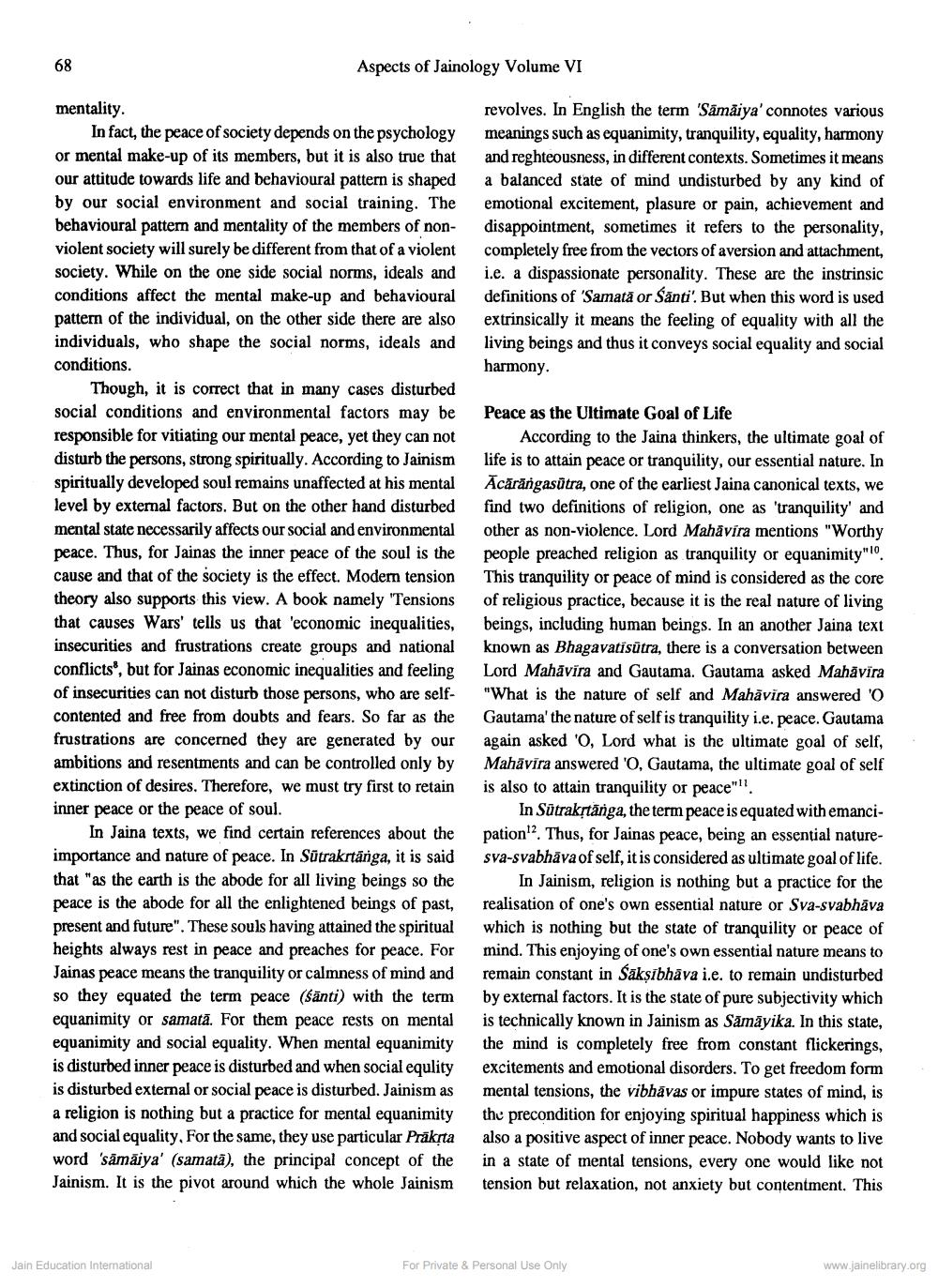Book Title: Jaianas Concept of Peace Author(s): Sagarmal Jain Publisher: Z_Shwetambar_Sthanakvasi_Jain_Sabha_Hirak_Jayanti_Granth_012052.pdf View full book textPage 3
________________ 68 Aspects of Jainology Volume VI revolves. In English the term 'Sämäiya' connotes various meanings such as equanimity, tranquility, equality, harmony and reghteousness, in different contexts. Sometimes it means a balanced state of mind undisturbed by any kind of emotional excitement, plasure or pain, achievement and disappointment, sometimes it refers to the personality, completely free from the vectors of aversion and attachment, i.e. a dispassionate personality. These are the instrinsic definitions of 'Samatā or Santi'. But when this word is used extrinsically it means the feeling of equality with all the living beings and thus it conveys social equality and social harmony. mentality. In fact, the peace of society depends on the psychology or mental make-up of its members, but it is also true that our attitude towards life and behavioural pattern is shaped by our social environment and social training. The behavioural pattern and mentality of the members of non- violent society will surely be different from that of a violent society. While on the one side social norms, ideals and conditions affect the mental make-up and behavioural pattern of the individual, on the other side there are also individuals, who shape the social norms, ideals and conditions. Though, it is correct that in many cases disturbed social conditions and environmental factors may be responsible for vitiating our mental peace, yet they can not disturb the persons, strong spiritually. According to Jainism spiritually developed soul remains unaffected at his mental level by external factors. But on the other hand disturbed mental state necessarily affects our social and environmental peace. Thus, for Jainas the inner peace of the soul is the cause and that of the society is the effect. Modem tension theory also supports this view. A book namely 'Tensions that causes Wars' tells us that 'economic inequalities, insecurities and frustrations create groups and national conflicts', but for Jainas economic inequalities and feeling of insecurities can not disturb those persons, who are self- contented and free from doubts and fears. So far as the frustrations are concerned they are generated by our ambitions and resentments and can be controlled only by extinction of desires. Therefore, we must try first to retain inner peace or the peace of soul. In Jaina texts, we find certain references about the importance and nature of peace. In Sūtrakrtānga, it is said that "as the earth is the abode for all living beings so the peace is the abode for all the enlightened beings of past, present and future". These souls having attained the spiritual heights always rest in peace and preaches for peace. For Jainas peace means the tranquility or calmness of mind and so they equated the term peace (śānti) with the term equanimity or samatā. For them peace rests on mental equanimity and social equality. When mental equanimity is disturbed inner peace is disturbed and when social equlity is disturbed external or social peace is disturbed. Jainism as a religion is nothing but a practice for mental equanimity and social equality. For the same, they use particular Prākrta word 'sāmäiya' (samatā), the principal concept of the Jainism. It is the pivot around which the whole Jainism Peace as the Ultimate Goal of Life According to the Jaina thinkers, the ultimate goal of life is to attain peace or tranquility, our essential nature. In Acārangasūtra, one of the earliest Jaina canonical texts, we find two definitions of religion, one as 'tranquility' and other as non-violence. Lord Mahāvira mentions "Worthy people preached religion as tranquility or equanimity". This tranquility or peace of mind is considered as the core of religious practice, because it is the real nature of living beings, including human beings. In an another Jaina text known as Bhagavatisütra, there is a conversation between Lord Mahāvīra and Gautama. Gautama asked Mahāvīra "What is the nature of self and Mahăvira answered 'O Gautama' the nature of self is tranquility i.e. peace. Gautama again asked 'O, Lord what is the ultimate goal of self, Mahāvīra answered 'O, Gautama, the ultimate goal of self is also to attain tranquility or peace"!! In Sūtrakstānga, the term peace is equated with emancipation!2. Thus, for Jainas peace, being an essential naturesva-svabhāva of self, it is considered as ultimate goal of life. In Jainism, religion is nothing but a practice for the realisation of one's own essential nature or Sva-svabhāva which is nothing but the state of tranquility or peace of mind. This enjoying of one's own essential nature means to remain constant in Sākşibhāva i.e. to remain undisturbed by external factors. It is the state of pure subjectivity which is technically known in Jainism as Sāmāyika. In this state, the mind is completely free from constant flickerings, excitements and emotional disorders. To get freedom form mental tensions, the vibhāvas or impure states of mind, is the precondition for enjoying spiritual happiness which is also a positive aspect of inner peace. Nobody wants to live in a state of mental tensions, every one would like not tension but relaxation, not anxiety but contentment. This Jain Education International For Private & Personal Use Only www.jainelibrary.orgPage Navigation
1 2 3 4 5
